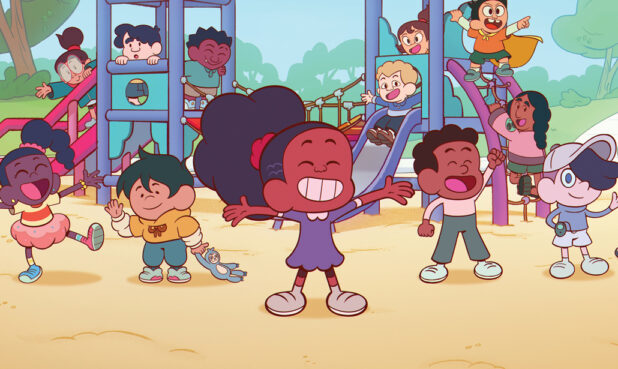






Christopher Amick, TAG member and Writer/Producer; Bradford Bricken, Partner/Manager, Cartel Entertainment; Matthew Ellis, Manager, Cartel Entertainment; Alison Mann, Manager and President of Animation, Fourth Wall Management; Bill Wolkoff, TAG member and Writer/Co-Executive Producer; Lori Shreve Blake,Senior Director for Career Engagement, USC Career Center.
What’s the deal? No, we’re not being flip. Everyone wants to get into the creative stuff, but before the work can begin, there’s the personal services contract, also known as the deal memo, that lays out the terms of a job assignment. Deal memos can vary from project to project based on the nature of the work, the duration of the project, and numerous other factors.
Salary and title are, of course, the key components to most deal memos. For TAG members looking to advance within the industry, these are part of a larger framework of considerations—and an endgame whereby both the employee and the producer/studio are happy. To reach that endgame, there are questions to be asked, concessions to be made, and terms to be negotiated.
In a deal memo itself, The Animation Guild’s main role is to ensure minimum wages are being met and that the employer is contributing the proper benefit amounts. Most other items above and beyond are up to the member to work out. This can include everything from a higher salary to a carve-out (see sidebar) to additional options should the show become a hit.
Considering that the deal memo is all about you, experts maintain that it’s important to know what the basic deal memo contains and whether there is the potential for a first offer to be improved. As easy as it may be to accept an early offer out of fear that it will be withdrawn if you negotiate, that’s not necessarily the way to get ahead. Bearing in mind that there is no one-size-fits-all formula, here are some ways to help you reach a deal you can be happy with.

The more you know about the situation you’re entering, the better prepared you will be to construct a deal memo that works to your advantage. Websites like Glassdoor can be helpful in determining what past employees at a given studio have earned and can also provide a window into the work culture. Colleagues who have worked with a given studio—or for a specific Showrunner or Director—can also provide valuable insight.
You’ll want to know about your salary certainly, but also what a daily or weekly schedule will entail and what exactly is expected of you. Does production tend to run late? If so, what might this mean in terms of your workload? Colleagues, mentors, friends, and about-to-be coworkers can help prepare you. You’ll know your own quote (the rate you have been previously paid or a rate you’ve decided is your bottom line and you don’t want to be paid less), but it will be helpful to know what someone else in a similar position on the same production will be making as well. You can ask whomever you are negotiating with if yours is a “favored nations” deal—an industry term that means you’re getting equal contractual provisions to others on the project.
Items you can get clarification on include “vacation, sick days and holiday policy, retirement policy, and any yearly or production bonuses,” says Alison Mann, Manager and President of Animation at Fourth Wall Management. “While speaking to the recruiter or production person [in charge of hiring], you can say directly, ‘Thanks so much for the offer, I want to understand the full comp package, can you please share with me the following…” With these questions clearly answered and written into your deal memo, the less ambiguity there will be if an issue arises once you’re hired.

You should never forget that you know your own value more than the person looking to hire you. It’s your job to convince an employer why they should hire you and nobody but you.
“Employers still want to get you on the cheap,” says Lori Shreve Blake, Senior Director for Career Engagement at the University of Southern California Career Center. “So it’s incumbent upon the candidate or the new employee to negotiate and show that they are a thinking person. In some cases, it may be a component of the job to be able to speak up in a professional manner, so here it’s on full display.”
Dollars and cents are always sensitive areas, both when you’re applying for the job initially and when you’re negotiating the final rate. Remember that rates that meet the minimum wage for your job category according to the Guild’s Master Agreement represent a floor, not a ceiling. According to Blake, you can ask for a first offer in writing and request a day or two to think it over.
It’s good practice to avoid getting pinned down on an initial figure. If you are asked how much you’re looking to earn, it’s best to be vague (“I’m sure you’ll pay me a competitive rate”)—and, if pressed, give a salary range instead of a single number. Whenever possible, let the employer throw out the first figure. If you know what a job like the one you are seeking typically pays, one rule of thumb is to add 20 percent to your first counteroffer and negotiate down from there.
“The person who mentions the number first loses,” says Blake. “Let them be the first to come up with a number, and then do your research to see whether that’s a fair offer.”
Even if the person hiring won’t move much on salary, you might be able to negotiate perks. TAG member Christopher Amick recalls an experience in which he and his writing partner, Ben Mekler, were asked to help develop a feature film for a friend. The partners figured they would put in a few of weeks of work, earn a couple thousand dollars, and do their friend a solid in the process.
That’s when their newly hired lawyers encouraged them to ask for additional things that Amick dismissed as “insane and outrageous.” Where they envisioned asking for $1,000 per week, the attorneys suggested asking for $5,000 with a guaranteed seven weeks and optional five-week extension, instead of the two that Amick and Mekler expected. They were also advised to ask for a production bonus and box office bonus—items that hadn’t occurred to them.
“I was afraid we were going to lose this job, insult the studio, and ruin our friendship with the director,” recalls Amick. “I almost negotiated against myself and told [our lawyers] to ask for less, but they basically said, ‘Let’s see what happens.’”
What happened was a happy ending. The studio agreed to nearly all their requests.
The person who mentions the number first loses. Let them be the first to come up with a number, and then do your research to see whether that’s a fair offer.—Lori Shreve Blake
“That was a wonderful experience that also helped me value my work so much more,” Amick says.
Not that a studio will routinely give you more just because you ask for it. You’ll need to have persuasive reasons and be able to plead your case convincingly.
“An artist needs to be able to advocate for why they should be paid a higher rate such as quotes, skills, experience, other competitive offers—and understand the risk and cost benefit of walking away,” says Bradford Bricken, Partner/Manager at Cartel Entertainment, a management and production company. “Sometimes these budgets are set, and producers can’t bend on the rate. That’s when it’s important to try and be flexible and see if there are other creative ways to find solutions that are not monetary.”
These solutions could range from specialized equipment, a more favorable credit, or schedule flexibility to getting a number of guaranteed weeks or loosened exclusivity to work outside of the studio. But remember, whatever you ultimately negotiate, get it in writing.

Having established a track record, including writing and executive producing on Kipo and the Age of Wonderbeasts, TAG member Bill Wolkoff was brought in to co-develop a web comic into an animated series for a major studio. Knowing that writers in animation often get treated “like a box of Kleenex,” Wolkoff says he would only sign on if his title included Executive Producer and Showrunner. When his reps took the demands to the studio, the studio finally agreed to make him an EP, but the role of Showrunner was not clearly laid out in the contract, a circumstance that would come back to bite him.
“It’s rare for writers to be kept on through delivery of the animatics, but as a Showrunner, that’s what it should be. There’s still work to be done after that, and that was what felt realistic to me,” Wolkoff says. Even though he was doing the work of a Showrunner, the studio moved up his end date and refused to honor his pay-or-play option, essentially firing him a year before the end of his contract and squeezing additional work out of him at a pay rate that he had not agreed upon.
Other issues to be aware of are exclusivity clauses or language that is so broad that it unfairly restricts your creativity or your ability to work on other projects. If you’re on an adult show, does that mean you can’t also do some work on a kids show on the side or vice-versa?
“Let’s say you’re working on a show that’s about toasters, and [the studio says] you can’t work on anything that’s even remotely kitchen-related for the next three years after this deal is done. That’s just too broad,” says Matthew Ellis, a Manager at Cartel Entertainment. “There are things that are going to be overcomplicated that may or may not actually be enforceable and that would really hinder your ability to get work in the future.”

Within TV, the proliferation of streaming has made deal-making a bit more complicated and left workers with the need to be vigilant over such factors as what their title means, exactly how long a season lasts, and the duration of their commitment to a studio. Contractually mandated pay bumps between seasons are well and good, but it’s not unusual for a streaming studio to pay by the episode order and then get creative about where one season ends and another begins.
In the early years of his career, Bricken was accustomed to the traditional model within legacy studios. Nickelodeon had its mandates, as did Warner Bros. and Sony without significant variation. Over the past decade, the arrival of Netflix and other streaming services shook things up and introduced new variables for employees whose product would now never be “off-service.”
“Are there bonuses?” asks Bricken. “Are there upsides, or are we just working for fees? We had to figure those out …. We want to make sure that in [the case of a] success, we have thought of everything so our clients aren’t in the position where they helped deliver this huge hit show and then they see it everywhere, all over every store, on every kid’s backpack, and they did not make much on this at all. That’s something you always want to try to avoid.”

Amick, who works in both animation and live action, says that writers and artists who are hired for what is essentially a freelance gig may feel like they have very little power when negotiating with a studio, but that is not entirely true.
The only leverage we have as writers—but also as artists and anybody who is entering into what ends up being a freelance contract—is the ability to say no. Our ability to walk away from a bad deal. —Christopher Amick
“I really do believe that the only leverage we have as writers—but also as artists and anybody who is entering into what ends up being a freelance contract—is the ability to say no. Our ability to walk away from a bad deal,” says Amick. “A lot of times, when it’s someone’s first job, they’re not going to walk away no matter what just because they want the experience. That’s why we have a Guild to make sure there is a floor and that [people] can’t undercut themselves.”
After all, in animation as in live action and all other industries, you are the CEO of your own company, the protagonist of your own story. “What makes a good protagonist is somebody who has agency, who is driving things forward, and when people are the lead, and they know what their goals are and it’s clear and it’s communicated, I think things work out,” says Mann. “At the end of the day, what is important is that you’re legislating a great collaboration between yourself and the [employer] so there is a clear expectation and pathway for success.”



